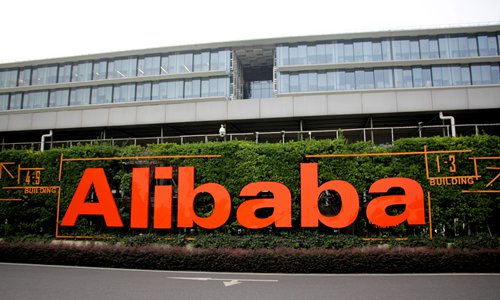HOME >> BUSINESS
Smaller traders grow faster: Alibaba
By Xie Jun in Hangzhou Source:Global Times Published: 2019/10/21 21:55:46
Payment, promotional measures turn more flexible

Alibaba's headquarters in Hangzhou, East China's Zhejiang Province Photo: IC
China's cross-border trade is undergoing changes such as more fragmented orders. Those changes strike a blow to large primary traders, but bring more opportunities for a new generation of younger, more open-minded traders in China, reflected by their fast-growing business on international wholesale marketplace alibaba.com.
The company's top executives told the Global Times on Monday that these newcomers still account for a small proportion of China's overall traders, about 5 percent, but their ranks are growing rapidly, they said.
"We find that the whole structure of alibaba.com's clients, whether buyers or sellers, are getting increasingly younger with nearly 60 percent of the buyers being born after 1985. Compared with larger, more old-fashioned traders who often rely on just one or a few clients, their business scale is small but are more flexible, put efforts into multiplying clients, embrace the internet and update their products more frequently," Yu Yong, vice president of alibaba.com, told the Global Times on Monday.
"Apparently, their ability to counter trade risks is much stronger than some of their seniors," Yu said, adding that those smaller traders are pushing most of the trading activities on alibaba.com.
Data released by the company for its purchasing festival in September this year, which is like the Double 11 shopping spree for cross-border consumer-to-consumer trade, also showed that domestic smaller traders have seen rapid business growth.
According to data sent by alibaba.com to the Global Times, the number of actual buyers during the festival, rather than those who only made inquiries, rose by 96 percent on a yearly basis, while the number of orders rose by 117 percent.
Transactions with US buyers surged by 117 percent year-on-year on alibaba.com during the festival, while volume from countries and regions along the routes of the Belt and Road Initiative surged by 114 percent on a yearly basis. Those figures were in marked comparison with China's overall trade picture, which is under great pressure because of rising protectionism in the world. Customs data showed that in US-dollar terms, China's exports slipped by 0.1 percent year-on-year in the first nine months of this year, while exports to the US slipped by 10.7 percent.
According to Yu, overall foreign trade isn't shrinking too much for China, but external trade friction is leading to changes in the industry, with orders becoming more "fragmented". Payment methods and promotional tactics are also evolving as a result.
"The changes actually provide opportunities for the younger generation of private traders in China who are better at smaller-scale business, while the traditional, larger traders will suffer from the change," he said.
Zhang Kuo, joint general manager of alibaba.com, also noted that there are opportunities for China's smaller traders.
"Take the electronics industry for example. The US' protectionist stance is pushing third countries like South Korea to source China's electronic products as alternatives… Besides, China's technological updates and evolution are generating business opportunities for those industry players," Zhang said.
The Chinese government is taking measures such as lowering general tariff levels, keeping the yuan stable and increasing foreign trade loans to stabilize overseas trade.
Zhang said that alibaba.com is striving to maximize the effects of those policies via means such as helping digitalize the process of getting tax refunds.
Posted in: COMPANIES